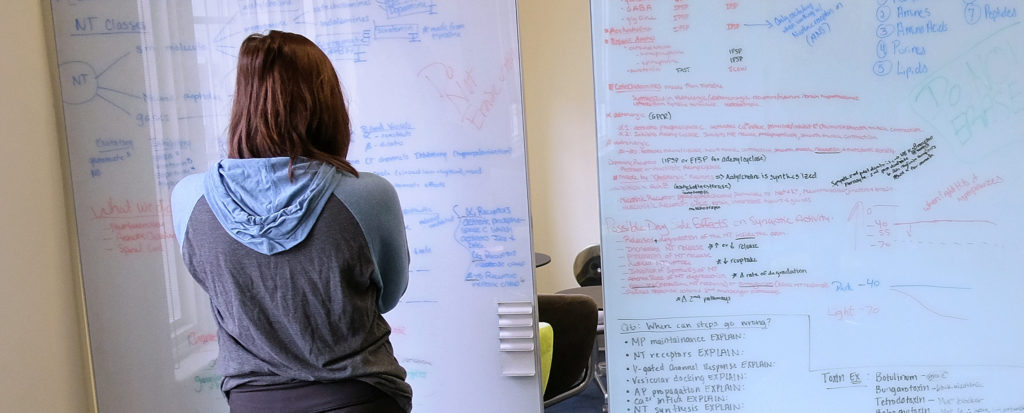A whiteboard full of math equations – snap! A tutoring notice on a professor’s door – snap! A room number sign in Braille – snap! With each new discovery, the students’ cameras clicked and moments later a new photo went flying into the Twittersphere.
Back in Trinkle Hall, Assistant Professor of Education Victoria Russell – perhaps better known as @techtweed in this instance – watched the tweets stream through her feed.

“They’re looking for real-world principles of what’s called UDL – universal design for learning,” said Russell, who created the scavenger hunt as a way to bring game-based pedagogy into the classroom. “UDL is a framework for making education accessible to all learners, so the students are looking for existing examples on UMW’s campus.”
It didn’t seem to take long. Within minutes of giving students the “green light,” Russell’s feed was filled with samples from all over the Fredericksburg campus.
“Braille is a good example of UDL,” said sophomore Hannah Manning, a Spanish and psychology major combing through the Hurley Convergence Center with her team. “UDL has different principles and guidelines, so Braille provides options for perception. Another example would be a study abroad flyer, which provides options for engagement by recruiting interest in the topic.”
The collaborative challenge is part of the College of Education’s course introducing future teachers to special education. Built with aspects of role-play, the course sets a framework in which the students are newly hired faculty building a school with a mission of inclusive education. Through various challenges and projects, the students-turned-faculty get to work designing classrooms and lesson plans that could engage any student.
“It’s not just about the student with a diagnosed disability,” said Russell, who also serves as the director of UMW’s Special Education program. “We’re all different and we all process things differently. In meeting the needs of targeted learners, you’re also meeting the needs of lots of other students who might be forgotten because they don’t have a diagnosis, plan or a case manager. It helps build equity in the classrooms.”
When designing their new curricula, it’s all about overcoming barriers to learning for future students. And some of those roadblocks are more obvious than you might think.
“Motivation and personal connection is an important piece of education,” said Russell. “So if you hate math, for example, and are taking a math class – then motivation is a barrier. If you’re not motivated, you won’t pay attention and won’t engage and you will end up missing things.”
The solution? Examining learners’ strengths and needs from the outset and making sure the barriers are reduced or removed entirely when designing education. And that’s just what Russell’s students are doing when it comes to creating their lesson plans.
“Teaching requires flexibility,” said Russell, whose expertise is in inclusive teaching, particularly with students with high-incidence disabilities. “You can’t go into teaching thinking it’s my way or the highway. That’s not how people learn.”
Her expertise has found a niche at UMW where there are significantly more students with registered disabilities compared to other four-year public colleges in Virginia. And that trend is only growing. Since 2012, UMW’s Office of Disability Resources has seen a 45% increase in the number of students who have disclosed and registered their disability.
“We have a responsibility to meet students where they are,” said Russell, who stresses that the problem is often with the curriculum and not the student. “It’s not about lowering standards or taking away the intensity or rigor of a class. It’s about asking how you might do things differently and still have the highest standards for students.”
That’s exactly what UMW is setting out to do, both in its own classrooms and in preparing future teachers to educate the next generation in classrooms around the world.
“Ten to twelve percent of students in classrooms across the country have some kind of educational disability,” said Dean of the College of Education Pete Kelly, whose teaching and research focuses on special education. “Our students will be their teachers and they need training to be successful. That’s at the heart of it.”
The subject is front and center for Mary Washington and its College of Education, but Kelly’s vision goes beyond accessible learning.
“We’re trying to build inclusive schools, but really we’re building a foundation for a more inclusive society,” said Kelly. “It’s something we need to do and it’s really cool that UMW is a part of that story, helping build bridges for people who have differences.”



